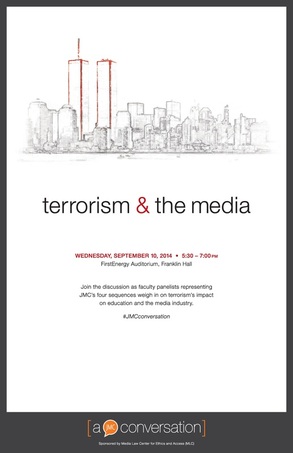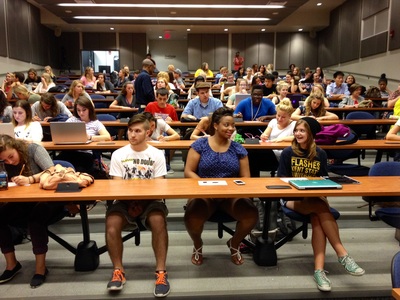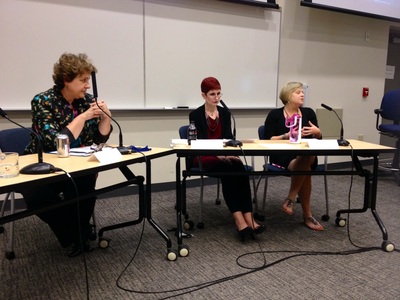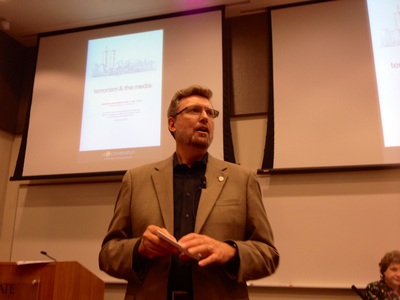|
by Morgan Jupina For many Kent State students, college graduation is quickly approaching, and it’s time to meet the “real world.” Job searching, resume building and interview prepping are all a part of our final sprint as college students. But what if you’re still trying to figure out what you want to be when you grow up? I had the opportunity to meet with someone who might be able to provide you with a unique perspective. “A lot of what we deal with is foreign individuals who threaten the United States,” he explained. Twenty-year public service veteran and passionate guest speaker at this year’s KSU Media Ethics Workshop, Joe Vealencis, sat down with me to discuss the ins and outs of a career in public service. Vealencis, director of the Office of Strategic Communications at the National Counterterrorism Center (NCTC) – created in 2004 in an effort to stop terrorist action in the United States and abroad – ensures communications are coordinated in various tasks. Vealencis’ responsibilities range from facilitating visits to NCTC from senior officials of foreign organizations, to overseeing public affairs specialists who work on a wide variety of communication, design and publication assignments. Aside from being a man in a suit with a profoundly intimidating career, I learned that he landed his job by following his dream to help people. Vealencis, who wanted to be a lawyer at a very young age, graduated with a degree in marine and environmental science from the United States Coast Guard Academy. After beginning his career as a Commanding Officer in the U.S. Coast Guard, Vealencis eventually worked his way from Senior Legislative Liaison for the Office of the Director of National Intelligence, to his current position. Law to environmental science to NCTC is quite a winding path, but Vealencis is a prime example of being able to accomplish anything you set your mind to. Vealencis expressed that “the mission at the center” of his job is the most gratifying part of his chosen career because he gets to help protect Americans. Obviously, he didn’t graduate college knowing how to counter terrorism, but he went after a job he was interested in. “Public service has always been something that interested me and opportunities presented themselves,” said Vealencis. “I feel good about myself when I go home at night.” Sometimes, when attacks such as the Boston Marathon Bombing occur, Vealencis’ job can become emotionally difficult. “It would be hard to describe what a punch in the gut that was for the men and women of NCTC,” Vealencis remembered. “Some say we should have checked the brothers’ Facebook posts, Twitter and social media even after they were cleared through a robust investigation.” He said he was taking a much-needed vacation in the Dominican Republic, but came back immediately when he had heard about the attack. “I didn’t have to. I just came back. A lot of people did and that’s the kind of place we work,” he said. “We’re going to try to protect you. It’s our family too; it’s our friends too, and it’s our neighbors.” It was evident that Vealencis was remarkably passionate about his career, which I believe to be a great model to follow. Careers in public service can range from federal, state and local government agencies, as well as public and private organizations, and can bring great benefits. Vealencis told me that aside from excellent health benefits, public service allows people to be able to do great things, and it provides a sense of stability. He suggested that students interested in a similar career path develop skill sets in which they are humble, a good communicator in written and spoken word, and that they are able to drive consensus within a free and open conversation. However, he said students also need to have patience in a public service job. “The wheels of government do not turn quickly,” explained Vealencis. “We would rather do it right than do it quick, and those are naturally at odds with each other.” Whether you desire to work in public service or not, Vealencis shows how taking risks for what you’re interested in can get you further in the long run. Don’t be discouraged if you don’t know what you want to be when you graduate. According to Vealencis’ story, you can be anything you set your mind to. Vealencis encourages students to apply to any positions they are interested in even if it is not a first choice. Eventually, you will migrate to a career in public service you enjoy or to the job you’ve dreamed of. “Don’t give up. Keep trying and don’t put all your eggs in one basket.” he said. Watch the video below for more from the Vealencis interview.
0 Comments
 by Jamie Brian and Gabrielle Gentile Kent State University's School of Journalism and Mass Communication hosted an open forum on Sept. 10 to recognize the 13th anniversary of 9/11 and discuss the effects of terrorism on American society. The panel discussion “Terrorism and the Media” featured JMC faculty members Jan Leach, Stephanie Danes Smith and Wendy Wardell relating their views on terrorism from experiences in their respective fields. The panel examined the moral and ethical impact of terrorism on public relations, advertising, journalism and digital media. JMC Director Thor Wasbotten encouraged students to participate in the discussion. “Your first media memory was a terrorist attack that led to a lot of other things happening throughout this country and the world. It’s been a part of your life for as long as you can remember,” Wasbotten said. “Terrorists will exploit whatever tactic that gains the most media attention. This isn’t just a news issue. It affects you, too.” Wardell offered her view from an advertising perspective. She said advertising is all about the connection between people and brands and, more importantly, brands to consumers. Some may have been confused why advertising was present at a terrorism event. Wardell explained much of terrorism employs very sophisticated, strategic advertising. ISIS demonstrates this very complex marketing and advertising. ISIS' increasing strength caused growing concern among students and faculty. Former CIA senior executive Smith said ISIS’ messaging is extremely sophisticated and effective. “Terrorism today is more complicated, more widespread and, potentially, more dangerous than 9/11,” Smith said. “ISIS is not a terrorist organization; it is a terrorist army.” ISIS uses semantics and words that resonate strongly with its target demographics. ISIS recently declared the creation of the Islamic caliphate. Smith explained the word caliphate holds a very deep and spiritual meaning with Muslims. Smith said she has confidence the U.S. will be successful in destroying ISIS but posed a concerned whether or not the U.S. will ever be successful in destroying the ideology behind it. Leach added her own perspective on terrorism via her media ethics background. She explained pictures and videos can be very effective but can also be offensive. She said it is vital to examine the newsworthiness and ethics behind a picture and how to minimize harm as a reporter, journalist or consumer of media. Leach responded to a student who noted media in the states is very American-centric. She explained American media is in the business to make money. Americans want to buy and hear the media they want to hear. Wardell elaborated by explaining what Americans say they want to consume and what they actually want to consume are two very different things. Leach closed the conversation with a call for students to take the future of media into their own hands. “You are the future, and you can make a difference. I see in you, the opportunity to use other forms of media to sell the information,” Leach said. Students were very engaged and eager to share their thoughts during this discussion. The room was full of passionate young people ready and willing to take Leach’s call to action. The event had a great turnout and was a complete success for everyone involved. It is always a humbling and enchanting experience when faculty and students meet to collaborate on a prominent world issue. Wasbotten plans to host forums once a month to engage student and faculty perspectives. Next month’s conversation is entitled “Diversity Redefined.” |
Archives
February 2024
Categories
All
|



 RSS Feed
RSS Feed
